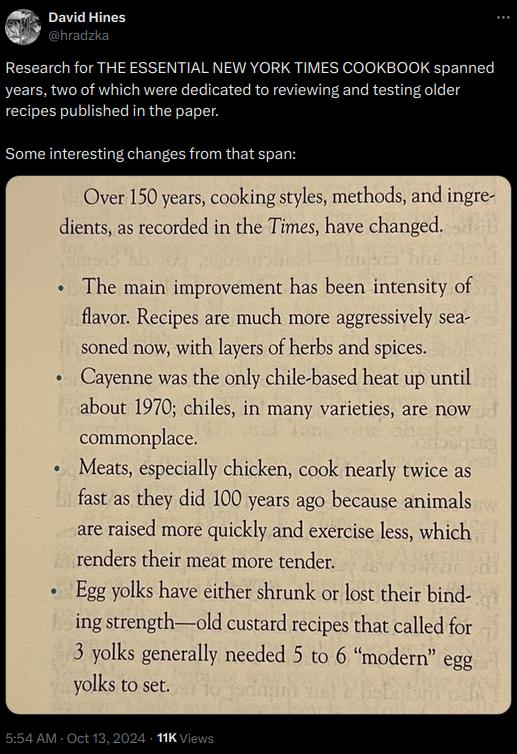this post was submitted on 13 Oct 2024
673 points (99.3% liked)
Science of Cooking
1111 readers
1 users here now
Welcome to c/cooking @ Mander.xyz!
We're focused on cooking and the science behind how it changes our food. Some chemistry, a little biology, whatever it takes to explore a critical aspect of everyday life.
Background Information:
founded 1 year ago
MODERATORS
you are viewing a single comment's thread
view the rest of the comments
view the rest of the comments

I believe the cooking changes happened, but I don't believe the authors conclusions as to why the changes happened. For instance, it was common place just 25 years ago that the Thanksgiving turkey was slow cooked for like 12 hours and basted while it sat in a pan, or kept and cooked inside an oven bag. More recent times, word has spread that it ends up way better to cook it faster at a higher heat. Not because anything about the birds changed, but because we became more educated at cooking and taking temps and different methods were able to be tried and shared faster due to the internet existing.
I'm betting chicken always could have cooked faster. I'm also betting something else is the reason for the custard recipe besides yolks binding less. Eggs changed a lot over the mass production thing, but nothing has reported a change or drop in the proteins. There's also a 100 ways to make an egg custard so chances are more that the older recipe had several differences compared to the newer one. I'm sure more modern egg custard recipes are different again. A lot of the popular ones today don't just use the yolks and don't even use whole milk. Cooking methods always change.
Age and activity level absolutely effect how "tough" meat is. I've raised and cooked both heritage breed chickens and modern broilers. The former take 2-3 times as long to reach maturity, are far more active, and as a result are "tougher". You can cook them just as fast a broiler, but the end result is going to be tough/chewy meat. The longer cooking time is needed to achieve equally tender meat.
It's the difference between cooking a rib-eye and a brisket.